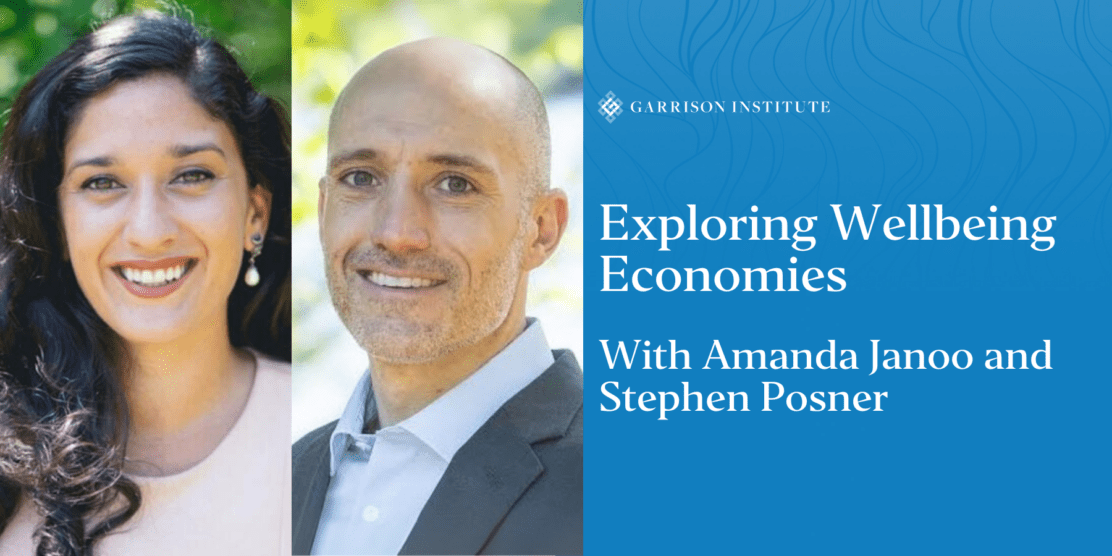Exploring Wellbeing Economies
In a world grappling with rapid and interconnected social, ecological, and economic changes, a growing movement is reimagining a future centered on the wellbeing of people and the planet.
In a recent Garrison Institute Forum with Stephen Posner, director of the Pathways to Planetary Health initiative, Amanda Janoo shared her personal journey and insights into economic paradigms and the transformative shifts underway. Amanda is the economics and policy lead for the Well-Being Economy Alliance.
Amanda was born on a farm in rural Vermont, and her upbringing informed her perspective that the economy has not been designed in a way to serve the wellbeing of most communities. The economy is a system that includes how people create, share, trade, and use things of value. As Amanda dove into the field of economics, she found that the underlying assumptions of mainstream economic theory failed to reflect the full breadth of human nature and the complex realities of the world.
“The idea in economics that we’re all individualistic, selfish, competitive, and materialistic didn’t resonate with my understanding of myself or others.” —Amanda Janoo
Amanda’s experiences, from studying the history of economic thought to working in industrial policy with the United Nations, led her to a pivotal realization: the economy should not be an end in itself, but rather a means to improve the wellbeing of all life on the planet. This insight became the driving force behind her involvement with the Wellbeing Economy Alliance, a global movement dedicated to redefining the purpose and metrics of economic success.
At the heart of the wellbeing economy approach is a fundamental shift in perspective. Rather than viewing people and the natural world as resources to be exploited for economic gain, we can redesign economies based on recognizing the inherent value and interconnectedness of all life. This ethos is exemplified in the Aina Aloha Economic Futures framework developed by Native Hawaiians, which evaluates economic initiatives based on their alignment with core community values and their relationship with the environment.
When Stephen inquired about ways to enable a broad perspective shift in economics, Amanda emphasized the importance of imagination and the willingness to question deeply embedded assumptions about the nature of the economy.
“We need more imagination when it comes to the economy. The idea of a labor market, for instance, is something we’ve accepted as normal, but it’s actually quite a flawed concept to have a market for people.” —Amanda Janoo
Cultivating new capacities, such as the ability to think creatively, systemically, and collaboratively, is crucial for enabling this paradigm shift. Stephen referenced Elinor Ostrom, who won the Nobel Prize in Economic Science for her groundbreaking work demonstrating how local communities can effectively manage shared, common resources like fisheries, forests, and fields for grazing. Amanda pointed to the work of thinkers like Karl Polanyi, who critiqued the false commodification of people, nature, and money under the project of capitalism, and the insights of economists like Amartya Sen, who have championed a capabilities approach to wellbeing.
Both Stephen and Amanda acknowledged the significant challenges inherent in transforming economic systems that have been designed around linear, mechanistic, and hierarchical worldviews and emphasized how humility aids collaborative learning and supports alternative cultural paradigms and wisdom traditions marginalized by dominant Western economic frameworks.
Encouraging individuals to get involved with the Wellbeing Economy Alliance, Amanda foregrounded the importance of building community, fostering multi-stakeholder engagement, and showcasing hopeful examples of wellbeing economy initiatives. Stephen pointed to work from ecological economists and The Serviceberry, a recent book by Robin Wall Kimmerer that explores concepts like the “gift economy,” which resonate deeply with the wellbeing economy ethos.
As the world grapples with the consequences of a growth-obsessed economic model, the wellbeing economy movement offers a compelling vision for a thriving world. By redefining progress and success in terms of collective flourishing, rather than narrow measures of material output or market transactions, this paradigm shift holds potential to address some of the root causes of our most pressing challenges and pave the way for a more just, sustainable, and compassionate future.
Watch the full conversation:
About the Speakers
Amanda Janoo is the economics and policy lead for the Wellbeing Economy Alliance (WEALL). An economic policy and systems change expert with over a decade of experience working with governments and international development institutions around the world, her work aims to build just and sustainable economies through wellbeing-oriented and participatory policy design processes. Prior to joining WEAll, Amanda worked for the United Nations and the African Development Bank as an industrial policy and structural transformation expert.
Stephen Posner, PhD is the director of Pathways to Planetary Health at the Garrison Institute, where he develops practical, scalable approaches to addressing planetary health challenges. Stephen’s work applies science and contemplative practice to regenerative economics, biodiversity protection, and ecological cultures—in the context of local places and global forums. He has over 20 years of experience building understanding across sectors and has consulted as an economist to measure how global companies impact and depend on nature. He holds a Bachelor of Science degree in astronomy and physics and a PhD in natural resources and economics.
Additional Resources
Garrison Institute Forums:
- A Transformative Conversation on Moral Economies
- A Framework for a Regenerative and Distributive Society with the Doughnut Economics Action Lab
- The Common Good with Indy Johar from Dark Matter Labs
Beyond GDP movement:
- WEAll session at the UN Summit of the Future on Rethinking Economic Success for a Sustainable Future
- Beyond GDP: The Need for New Measures of Progress
- New Measures for a New Economy
Jean Jacques Rousseau on democracy, civil society, and the social contract
